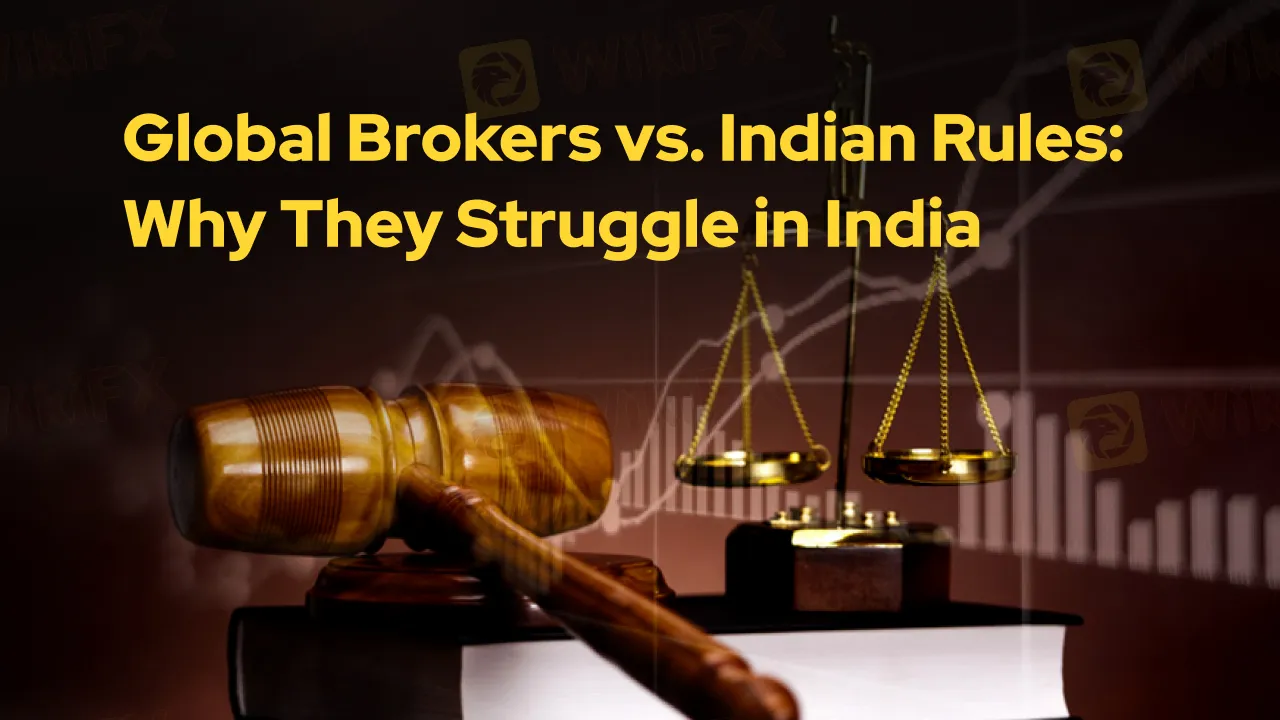简体中文
繁體中文
English
Pусский
日本語
ภาษาไทย
Tiếng Việt
Bahasa Indonesia
Español
हिन्दी
Filippiiniläinen
Français
Deutsch
Português
Türkçe
한국어
العربية
Global Brokers Vs. Indian Rules: Why They Struggle in India
Abstract:RBI issued a warning last year against 75 forex brokers. Those brokers are globally popular and regulated in other countries, but they are banned in India. Only few brokers even have physical offices located in India. So, why do global brokers face so many challenges in entering the Indian market?

The Central Bank of India, a (RBI) issued a warning last year against 75 forex brokers. Those brokers are globally popular and regulated in other countries, but they are banned in India. Only few brokers even have physical offices located in India. So, why do global brokers face so many challenges in entering the Indian market?
1. Strict Regulatory Framework
Indias financial markets are governed by the Securities and Exchange Board of India (SEBI), which enforces tight rules to protect retail investors. Only SEBI-registered entities can legally offer investment or trading services. Most international brokers are not registered with SEBI, making their operations in India non-compliant.

2. Restrictions on Forex Trading
The Reserve Bank of India (RBI) allows forex trading only in currency pairs involving the Indian Rupee (INR) and only through recognized Indian exchanges (like NSE or BSE). International brokers offering global currency pairs (like EUR/USD or GBP/JPY) are technically offering services outside RBIs legal scope for Indian residents.
3. Banking & Payment Barriers
Indian banks are required to report and restrict forex-related payments to unregulated offshore entities. This makes it difficult for traders to deposit or withdraw funds from international platforms using standard payment methods.

4. Legal Risks for Traders and Brokers
Indian residents using unauthorized platforms risk violating FEMA (Foreign Exchange Management Act) rules. Likewise, brokers operating without SEBI approval may face legal action or blocking by Indian authorities.
5. Regulatory Conflict
Even if a broker is regulated in top-tier jurisdictions like the UK (FCA), Australia (ASIC), or Cyprus (CySEC), that license does not apply in India. The Indian government does not recognize foreign regulation for local operation.
6. Blacklist of RBI
The RBI has publicly warned against dozens of foreign brokers and listed them as unapproved. This discourages investors and damages the broker's reputation in the Indian market.
Stay Updated—Join WikiFX India Community
Want to stay informed about the latest Forex trends, news, and learning opportunities? Join our Telegram community: WikiFX India. We focus solely on educational updates, market insights, and verified promotional alerts. This telegram group does not provide investment advice, financial signals, or trading recommendations.
Please note: This article is for informational purposes only and does not constitute financial advice.

Disclaimer:
The views in this article only represent the author's personal views, and do not constitute investment advice on this platform. This platform does not guarantee the accuracy, completeness and timeliness of the information in the article, and will not be liable for any loss caused by the use of or reliance on the information in the article.
Read more

Investing Capital in Focus as Complaints on Withdrawal and Other Issues Mount
Explore this guide we have exposed Investing Capital, which has mounted concerns for traders by disallowing withdrawals and making them lose their hard-earned money.

4 Warning Signs That Indicate You May Get Scammed in Your Forex Investments
In this blog, we will share with you a guide telling you about the tactics fraudsters employ to dupe investors.

Aetos: A Closer Look at Its Licenses
With multiple regulatory entries and one license now revoked, Aetos stands as a broker requiring closer scrutiny from investors, particularly those prioritizing license scope and jurisdictional compliance.

APX Prime: No Regulation, No Withdrawals? A Closer Look at the Red Flags
With no valid license, a questionable registration in Saint Vincent and the Grenadines, and unresolved client complaints, APX Prime presents risks that traders cannot afford to ignore.
WikiFX Broker
Latest News
Capital.com Strengthens UK FinTech Ties with Key Memberships
10-year Treasury yield ticks higher as investors eye jobs report
Elon Musk's xAI raises $10 billion in debt and equity as it steps up challenge to OpenAI
Crypto Craze Fizzling Out? Here is Why
Public companies bought more bitcoin than ETFs did for the third quarter in a row
Stock futures are flat after investors sell tech names to start the second half of 2025: Live updates
Social Trading Goes Mobile at M4Markets
ACY Securities Expands Crypto CFD Offering with 24/7 Trading Access
Revelation: Makeup Artist, Social Media Influencer Involved in INR 1.62 Cr Forex Trading Scam
European Central Bank's tightening cycle is done,' chief economist says
Currency Calculator


